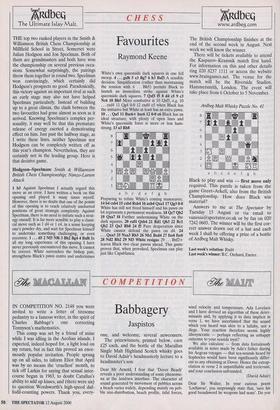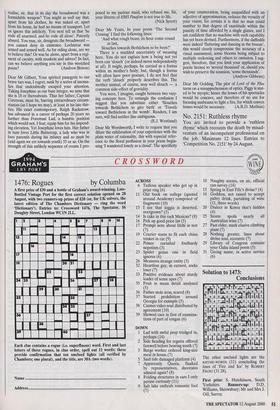COMPETITION
Babbagery
Jaspistos
IN COMPETITION NO. 2148 you were invited to write a letter of tiresome pedantry to a famous writer, in the spirit of Charles Babbage's one correcting Tennyson's mathematics.
This comp was set by a friend of mine while I was idling in the Aeolian islands. I expected, indeed hoped for, a light load on my return, but in fact this proved an enor- mously popular invitation. People sprang up on all sides, to inform Eliot that April was by no means the 'cruellest' month, to tick off Larkin for saying that sexual inter- course began in 1963, to doubt Catullus's ability to add up kisses, and (there were six) to question Wordsworth's high-speed daf- fodil-counting powers. Thank you, every- one, and welcome, several newcomers.
The prizewinners, printed below, earn £25 each, and the bottle of the Macallan Single Malt Highland Scotch whisky goes to David Adair's headmasterly lecture to a headmaster's son.
Dear Mr Arnold, I fear that 'Dover Beach' reveals a poor understanding of sonic phenome- na at the land/sea interface. The character of sound generated by movement of pebbles across a beach varies widely, depending mainly on peb- ble size-distribution, beach profile, tidal forces, wind velocity and temperature. Ada Lovelace and I have devised an algorithm of these deter- minants and, by applying it to data implicit in verse 1, we have ascertained that the sound which you heard was akin to a lullaby, not a dirge. Your reaction therefore seems highly idiosyncratic — perhaps reflecting an unhappy outcome to your seaside tryst? We also calculate — from data fortuitously available in notes made by Ada's father during his Aegean voyages — that sea-sounds heard by Sophocles would have been significantly differ- ent to any obtaining at Dover. Hence the extrap- olation in verse 2 is unjustifiable and irrelevant, and your conclusion unfounded.
(David Adair) Dear Sir Walter, In your curious poem `Lochinvar', you surprisingly state that, 'save his good broadsword he weapons had none'. Do you
realise, sir, that in its day the broadsword was a formidable weapon? You might as well say that, apart from his clothes, he was naked or, apart from his horse, he had no means of transport. Let us ignore this infelicity. You next tell us that 'he rode all unarmed, and he rode all alone'. Patently absurd. You may, sir, denigrate the broadsword — you cannot deny its existence. Lochinvar was armed and armed well. As for riding alone, are we to believe this? Or was he alone, apart from a regi- ment of cavalry, with muskets and sabres? In fact, can we believe anything you say in this wretched
poem? (Andrew Brison)
Dear Mr Gilbert, Your spirited panegyric to our brave tars was, I regret, sunk by a series of anoma- lies that undoubtedly escaped your attention. Taking Josephine as our base integer, we note that she is 18 or thereabouts. Thus her father, Captain Corcoran, must be, barring extraordinary circum- stances (as I hope we may), at least in his late thir- ties. His exact contemporary, Ralph Rackstraw, has advanced in a career of perhaps 20 years no further than Foremast Lad, a humble position which would not, I fear, equip him for his impend- ing elevation, Yet Josephine loves him. Her father in turn loves Little Buttercup, a lady who was in loco parentis during his infancy and so must be (and again we err towards youth) 55 or so. On the strength of this unlikely sequence of events I pro-
posed to my parlour maid, who refused me. Sir, your libretto of HMS Pinafore is not true to life. (Nick Syrett) Dear Mr Yeats, In your poem 'The Second Coming' I find the following lines: 'And what rough beast, its hour come round at last, Slouches towards Bethlehem to be born?' There is a mudded uncertainty of meaning here. You do not explain how a being not yet born can 'slouch' (or indeed move independently at all). It might, perhaps, be carried as a foetus within its mother's body; but, though a foetus will often have poor posture, I do not feel that the verb 'slouch' properly describes this. The mother animal, of course, may well slouch — a common side-effect of gravidity.
You were, I imagine, caught between two vary- ing concepts here. To untangle the confusion I suggest that you substitute either 'Slouches towards Bethlehem to give birth' or 'Travels toward Bethlehem in the womb'. Readers, I am sure, will find neither line ambiguous.
(E.J. Westland) Dear Mr Wordsworth, I write to request that you dilute the exhilaration of your experience with the plain water of rationality, this with especial refer- ence to the floral profusion in your poem begin- ning 'I wandered lonely as a cloud'. The specificity of your enumeration, being unqualified with an adjective of approximation, reduces the veracity of your vision; for certain it is that no man could number to that degree of exactitude within the paucity of time afforded by a single glance, and I am confident that no machine with such capability has yet been devised. Furthermore, if the daffodils were indeed 'fluttering and dancing in the breeze', this would clearly compromise the accuracy of a visual assessment, some blooms being subject to multiple reckoning and others to omission. I sug- gest, therefore, that you limit your application of poetic licence to 'several thousand' or, should you wish to preserve the scansion, 'some thousands'. (Andrew Gibbons)
Dear Mr Golding, The plot of Lord of the Flies turns on a misapprehension of optics. Piggy is stat- ed to be myopic; hence the lenses of his spectacles would be concave, and therefore of no use for focusing sunbeams to light a fire, for which convex



























































 Previous page
Previous page